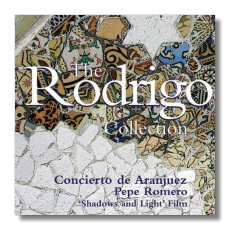
The Internet's Premier Classical Music Source
Related Links
- Rodrigo Reviews
- Latest Reviews
- More Reviews
-
By Composer
-
Collections
DVD & Blu-ray
Books
Concert Reviews
Articles/Interviews
Software
Audio
Search Amazon
Recommended Links
Site News
 CD Review
CD Review
Joaquín Rodrigo

The Rodrigo Collection
- Concierto madrigal
- Fantasía para un gentilhombre
- Concierto andaluz
- Concierto de Aranjuez
- Documentary: "Shadows and Light"
Pepe, Ángel, Celedonio, and Celin Romero, guitars
Academy of St. Martin-in-the-Fields/Neville Marriner
Philips 475654-5 DDD 75:28; DVD 96:36
Perhaps taking a cue from EMI Classics, which has done something similar lately, Philips has packaged a CD with a DVD, calling it "The Rodrigo Collection." The CD contains performances from the 1970s of the Concierto madrigal (brothers Pepe and Ángel Romero), the Fantasía para un gentilhombre (Pepe), and the Concierto anduluz, in which Pepe and Ángel are joined by their father Celedonio and their brother Celin. (Carelessly, Philips doesn't even list Celedonio and Celin's names, merely indicating "Los Romeros" as the soloists in this work.) The DVD starts with a studio performance of the famous Concierto de Aranjuez, with Pepe as the soloist. This is not dated, but I believe it comes from the early 1990s. This is followed by Larry Weinstein's 70-minute documentary about the composer, called "Shadows and Light." As it centers around Rodrigo's 90th birthday, it must date from around 1991.
I imagine many admirers of Rodrigo's music already will own some or all of the material on the CD, and making them buy it again just to the get DVD is a little mean. I was unfamiliar with these performances, however, and I was glad to make their acquaintance. I was unaware that Pepe Romero was a friend of the Romero family, and his performances, apart from being technically infallible, definitely bear the stamp of authenticity. (In the documentary, he movingly explains the genesis and the interpretation of the Concierto de Aranjuez and its endlessly popular second movement.) Not to bring Austria into it, but the Romeros and Marriner play Rodrigo with plenty of schmaltz, and with their hearts on their sleeves. Marriner is very scrupulous in his realization of Rodrigo's orchestral details. In short, while it understandable why collectors might favor this performance or that one, no one should be disappointed by what is offered here. In the Concierto de Aranjuez, performance footage is intercut with beautiful views of the eponymous palace and its surrounding grounds, and of the blind composer and his wife – both of them obviously very devoted to each other.
The latter material is largely extracted from Weinstein's documentary. Through interviews with the composer, friends, and family, this documentary gives a charming and bittersweet portrait of the aging composer. Weinstein touches on Rodrigo's younger years – his childhood, his blindness after an attack of diphtheria, his wife's nearly fatal miscarriage and how this traumatic event provided the inspiration for the middle movement of the Concierto de Aranjuez. It also shows how, by the 1990s, Rodrigo had become the Grand Old Man of Spanish Music. On several occasions, his sunny disposition is mentioned, but it also is shown that he was subject to moodiness and depression. In one segment, Pepe Romero reveals that Rodrigo once suffered some sort of personality crisis ("I don't know who I am!") which was resolved when the guitarist played him some of his music. The documentary is of a good length, and is respectful but not sycophantic in tone. I certainly feel closer to the composer now than I did before. It has made me want to explore works of his with which I am still unfamiliar, so on that count, this documentary and the "Rodrigo Collection" which contains it, is a decided success.
Copyright © 2005, Raymond Tuttle




















